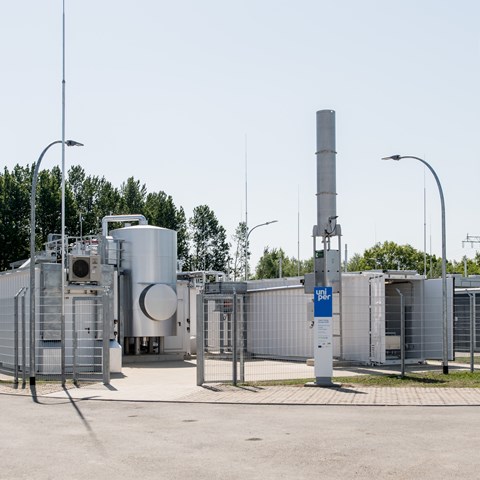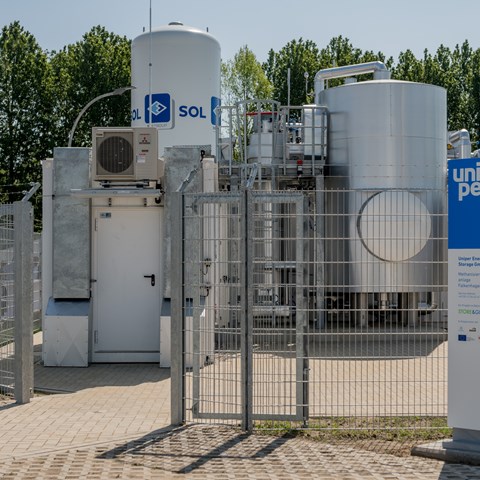Uniper Hydrogen CEO: Hydrogen is the now
In an interview with Energy Connects, Dr Axel Wietfeld, CEO of Uniper Hydrogen said that collaboration in the hydrogen industry exists and is flourishing; however, there remains a long way to go to full transition into using this gas. He elaborated that Uniper is working to be part of the big bang for the hydrogen industry, but it can only take place through proper cooperation.
It seems that a lot of firms view investing in hydrogen is a risk?
We see it as an opportunity because we are looking at it from a European perspective. In Europe we are already discussing the next step of what lies beyond natural gas. We are talking about decarbonising the entire industry and so do our clients, that is why we see it as an opportunity. Of course, at first glance it might look like a threat to the traditional business.
But our view is that it will come no matter what. We have enough experience in the business to know that you can't stop competition, you can't stop new developments. And consequently, for us, it makes a lot of sense to shape the markets, to be proactive and, to be a front runner, a pioneer in the hydrogen community.
The decision is taken to phase out coal and also in some countries to phase out nuclear. So hydrogen for us is the natural next step.


Power to Gas plant in Falkenhagen, Germany.
How realistic are we about the impact of hydrogen on decarbonisation? Is it actually the only way or the most efficient way?
The only way, probably not. But decarbonisation through hydrogen is one of the most efficient ways that we know of. Why? It can not only decarbonise our existing gas business. It also enables renewables. There are more and more renewables kicking in, which is fantastic. However, we have got the challenge that the renewables can be volatile and we need reliable sources of energy. Security of supply is still needed because the customers, our economies are dependent on this. With hydrogen we can make use of renewables, you get a molecule which can be stored and you can use when time is needed and when sun and wind are not available.
Therefore we believe that hydrogen is also a renewable economy. And without any backup, we would have problems. With hydrogen, you killed two birds with one stone: enabling the renewable power business and you also have a decarbonised gas which can be used for industrial purposes.
Do you think hydrogen would be the probable replacement that would avoid another gas crunch crisis in the future?
There are multiple reasons for this crisis. The high demand in Europe, resulting from a cold and long winter in Europe and economic recovery is one of them. Since the demand in Asia (e.g. China) and hence the willingness-to-pay was even higher, the energy has been sent towards Asia. In parallel, we faced a shortage of supply from various exporting countries due to maintenance activities. I don't think that we can entirely avoid those circumstances with hydrogen, we will
always have situations where some adverse conditions come together, which creates price peaks. However, we can balance the system with hydrogen much better because you can store it, directly use it in industry, and integrate the two most important sectors; the power and the gas industry.
Furthermore, it also requires international cooperation. We are very keen to produce hydrogen and we have a portfolio of projects to do it. However, the energy industry in Europe will not be able to produce hydrogen in the amount that is sufficient for the European demand. There are lots of reasons for this. One simple reason is that the land mass is not there to construct the renewable capacity, which would be needed to power all these electrolysers. Hence, we will be dependent upon imports, and for Germany more than 50 percent of the hydrogen consumed will be imported. For Europe, it is perhaps a bit less than 50 percent overall. Therefore we are also keen to develop a hydrogen economy in the sense of hydrogen as a commodity.
Can you talk to us about how Uniper is coordinating internationally and pushing the hydrogen economy forward?
Uniper has set itself the goal of actively shaping the international hydrogen market in the future. So we have great ambitions, but we cannot cover every part of the value chain. Therefore, there are some natural partners. Let`s start with technical equipment, as we are not an OEM, i.e. an equipment provider. Therefore we are cooperating, for example, with the likes of GE, thyssenkrupp and Siemens Energy because we rely on their competence.
Looking into other elements for hydrogen, we need renewables. So, how to get green electricity?
We just started building renewables ourselves with focus on wind onshore and photovoltaic, and hence we can clearly also use our renewable production for electrolysers in the future. But we need more, so it made sense for us to have a closer connection to the renewables industry. One example is our cooperation with Danish Ørsted, a large wind offshore producer because this access to renewables is just keen. Together we are stronger.
A lot of countries have a fantastic natural gas infrastructure for both pipelines and gas storages. Some companies are retrofitting those assets into hydrogen assets.
Since we are not really deeply involved in the gas transmission business, we are of course cooperating with transportation and transmission companies to get that right. When it comes to import then of course the partners are global to source hydrogen from.
We are having promising discussions about exporting hydrogen from the Middle East into Europe. We are also looking at other decarbonised forms of hydrogen and for that have cooperation talks with Russian Novatek.
It is for us to connect the dots and that is of course via ports. We are also working on receiving/ import terminals for hydrogen – similar to the LNG business. The current base case is that we would use ammonia because we believe that it's the best way to transport hydrogen for larger distances. There is a very exciting project in a small city in north Western Germany, Wilhelmshaven, with huge potential because there is deep water access and there is access to gas/ future hydrogen infrastructure with pipelines and the storage sites. In addition, this area is in close proximity to offshore wind. We are currently in the feasibility stage to assess ammonia transportation. Together with all key players, we want to build the necessary infrastructure for the future hydrogen economy as quickly and efficiently as possible.
How far are we in terms of infrastructure in transporting hydrogen?
It makes a lot of sense to use the existing natural gas infrastructure, pipelines and storage sites and that is in super condition, but needs to be upgraded for hydrogen usage.
Several companies are, as we speak, starting retrofitting these pipelines and storage systems into hydrogen systems. And that is possible. It needs some adaptation and consequently some investments. One example is the so-called hydrogen backbone initiative in Europe, they are planning to convert the existing pipeline infrastructure. We as Uniper are one of the largest storage operators in Europe and are conducting similar studies for our underground storage assets






